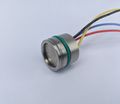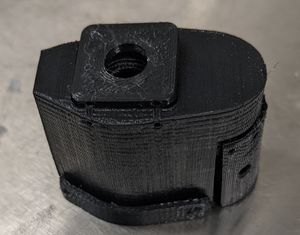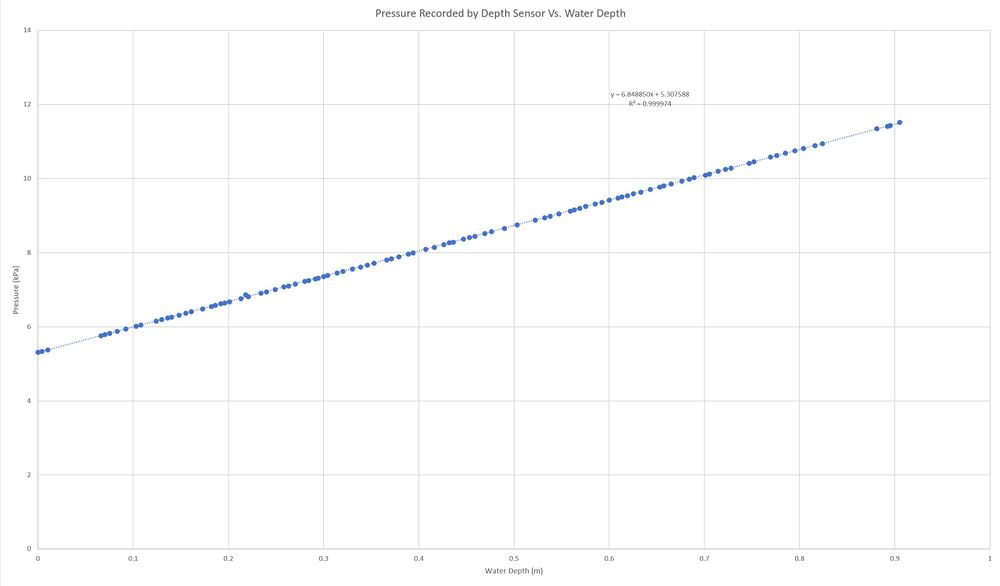Difference between revisions of "Depth Sensor v2"
| Line 31: | Line 31: | ||
== 22nd March 2020 == | == 22nd March 2020 == | ||
| − | [[File:Calbration Curve.jpg|thumb|right|1000px]] | + | [[File:Calbration Curve.jpg|thumb|right|1000px|Pressure recorded by depth sensor at a measured depth of water]] |
A calibration curve was created for the depth sensor in order to provide an accurate measurement of the water pressure and depth. | A calibration curve was created for the depth sensor in order to provide an accurate measurement of the water pressure and depth. | ||
| − | Recorded at 3.3 V and 18.90 C, the distance measurements were taken from the face of the sensing element that was 7mm from the bottom of a 19mm diameter tube. From this data we can conclude that the current formula f(x) should be modified to g(x) = 1.4324*f(x)-7.6024 to get an accurate readout of the pressure and h(x) = | + | Recorded at 3.3 V and 18.90 C, the distance measurements were taken from the face of the sensing element that was 7mm from the bottom of a 19mm diameter tube. From this data we can conclude that the current formula f(x) should be modified to g(x) = 1.4324*f(x)-7.6024 to get an accurate readout of the pressure and h(x) = g(x)/9.81 to get the depth of the water from the sensing element. |
If the sensor was exposed to just air on the sensing element, the output of the device was 5.30kPa, which is 15.14% of the maximum output of 35kPa and very similar to the manufacturers information which was 15% of the maximum value. | If the sensor was exposed to just air on the sensing element, the output of the device was 5.30kPa, which is 15.14% of the maximum output of 35kPa and very similar to the manufacturers information which was 15% of the maximum value. | ||
| Line 84: | Line 84: | ||
|} | |} | ||
The fluctuations in the results may be due to slight variations in the water level due to small volumes of the water evaporating and being replaced to maintain a constant water level. The temperature of the water may have also have affected the results. | The fluctuations in the results may be due to slight variations in the water level due to small volumes of the water evaporating and being replaced to maintain a constant water level. The temperature of the water may have also have affected the results. | ||
| − | |||
| − | |||
Revision as of 04:33, 31 March 2020
6th March 2020
Taking measurements of water pressure can be used to calculate the depth at which the reading was taken. The sensor compares the pressure of the water to the atmospheric pressure allowing it to output a relative reading of the water pressure. This permits us to take an reasonably accurate measurement of the water depth.
We have two similar depth sensors that output either an analog or i2c signal both of which can be received by most micro-controller devices.
19th March 2020
To allow for calibration and testing of the depth sensor, a 3D-printed housing was required. We also incorporated a EC mount into the design. The design had to be waterproof around the depth sensor, the EC prongs and the cable, each requiring o-rings to prevent water passage. It also had to have the depth sensor and EC prongs as close to the bottom of the probe as possible to provide reliable readings at a minimal depth of water. Multiple iterations had to be printed to ensure the tolerances of the 3D printer were accounted for.
22nd March 2020
A calibration curve was created for the depth sensor in order to provide an accurate measurement of the water pressure and depth.
Recorded at 3.3 V and 18.90 C, the distance measurements were taken from the face of the sensing element that was 7mm from the bottom of a 19mm diameter tube. From this data we can conclude that the current formula f(x) should be modified to g(x) = 1.4324*f(x)-7.6024 to get an accurate readout of the pressure and h(x) = g(x)/9.81 to get the depth of the water from the sensing element.
If the sensor was exposed to just air on the sensing element, the output of the device was 5.30kPa, which is 15.14% of the maximum output of 35kPa and very similar to the manufacturers information which was 15% of the maximum value.
30th March 2020
An experiment was undertaken to test the stability of the depth sensor. The results acquired were as follows:
| Time (Hours) | Water Depth (m) | Pressure (kPa) | Temperature (C) |
|---|---|---|---|
| 0.00 | 0.904 | 8.87 | 18.9 |
| 50.55 | 0.904 | 8.88 | 17.0 |
| 74.61 | 0.904 | 8.88 | 17.0 |
| 121.98 | 0.904 | 8.87 | 22.7 |
| 146.81 | 0.904 | 8.88 | 22.7 |
| 169.57 | 0.904 | 8.88 | 22.7 |
The fluctuations in the results may be due to slight variations in the water level due to small volumes of the water evaporating and being replaced to maintain a constant water level. The temperature of the water may have also have affected the results.




